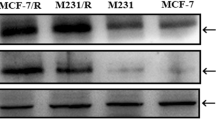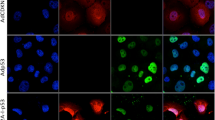Abstract
Breast cancer cells that overexpress HER-2/neu are more resistant to chemotherapeutic agents such as paclitaxel (Taxol) and docetaxel (Taxotere) than those that do not overexpress HER-2/neu. In previous work, we showed that the adenovirus type 5 E1A can repress HER-2/neu expression at the transcriptional level. Here we first demonstrated that paclitaxel sensitivity correlates with HER-2/neu expression level in a panel of mouse fibroblasts expressing different levels of HER-2/neu, and that downregulation of HER-2/neu expression by E1A sensitizes the cells to paclitaxel. To further test whether E1A can sensitize HER-2/neu-overexpressing human breast cancer cells to paclitaxel through E1A-mediated HER-2/neu repression, an adenoviral vector was used to transfer the E1A gene into two human breast cancer cell lines, MDA-MB-453 and MDA-MB-361, that overexpress HER-2/neu. After E1A delivery, we observed that HER-2/neu expression level was reduced, and cells were treated with paclitaxel. Cell proliferation assays showed a synergistic growth inhibition effect of E1A and paclitaxel. The synergistic effect was also confirmed by soft agar colony-formation assay. Breast cancer cell lines that express low levels of HER-2/neu, MDA-MB-435 and MDA-MB-231 cells showed no synergistic growth inhibition effect when treated on the same protocols. Thus, we concluded that the adenovirus type 5 E1A gene can sensitize paclitaxel-resistant HER-2/neu-overexpressing breast cancer cells to the drug by repressing HER-2/neu expression. This in turn may have important implications for the development of a novel therapy that combines chemotherapy and gene therapy.
This is a preview of subscription content, access via your institution
Access options
Subscribe to this journal
Receive 50 print issues and online access
$259.00 per year
only $5.18 per issue
Buy this article
- Purchase on Springer Link
- Instant access to full article PDF
Prices may be subject to local taxes which are calculated during checkout
Similar content being viewed by others
Author information
Authors and Affiliations
Rights and permissions
About this article
Cite this article
Ueno, N., Yu, D. & Hung, MC. Chemosensitization of HER-2/neu-overexpressing human breast cancer cells to paclitaxel (Taxol) by adenovirus type 5 E1A. Oncogene 15, 953–960 (1997). https://doi.org/10.1038/sj.onc.1201250
Received:
Revised:
Accepted:
Issue Date:
DOI: https://doi.org/10.1038/sj.onc.1201250
Keywords
This article is cited by
-
SCD5 expression correlates with prognosis and response to neoadjuvant chemotherapy in breast cancer
Scientific Reports (2021)
-
Abcc10 status affects mammary tumour growth, metastasis, and docetaxel treatment response
British Journal of Cancer (2014)
-
αB-Crystallin promotes oncogenic transformation and inhibits caspase activation in cells primed for apoptosis by Rb inactivation
Breast Cancer Research and Treatment (2013)
-
Anti-tumor Function of Double-promoter Regulated Adenovirus Carrying SEA Gene, in the Treatment of Bladder Cancer
Cell Biochemistry and Biophysics (2012)
-
Adenovirus 5 E1A enhances histone deacetylase inhibitors-induced apoptosis through Egr-1-mediated Bim upregulation
Oncogene (2010)



